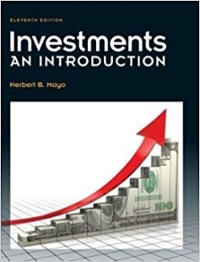Answered step by step
Verified Expert Solution
Question
1 Approved Answer
please answer all parts. thanks A Financial Ratio Analysis of Target Corporation A Liquidity Assessment Assume that you are a prospective lending bank of Target






please answer all parts. thanks
A Financial Ratio Analysis of Target Corporation A Liquidity Assessment Assume that you are a prospective lending bank of Target Corporation (TGT), a retailer of everyday essentials and fashionable, differentiated merchandise at discounted prices, and are interested in the company's historical and current financial activities and performance. Use the following financial data for Target to complete and conduct your financial ratio analysis. Then answer the questions that follow. Remember, the results of a ratio analysis often identify issues requiring additional investigation. 2009 $63,435,000,000 2008 $62,884,000,000 44,062,000,000 Target Corporation Selected Income Statement, Balance Sheet, and Related Data! Income Statement 2010 Sales $65,786,000,000 Less: Cost of goods sold 45,725,000,000 Gross profit 20,061,000,000 Less: Selling, general, and administrative expenses 13,469,000,000 Less: Other expenses 860,000,000 Earnings before interest and taxes (EBIT) 5,252,000,000 Less: Interest expense 757,000,000 44,157,000,000 18,727,000,000 19,373,000,000 12,954,000,000 13,078,000,000 1,521,000,000 1,609,000,000 4,673,000,000 4,402,000,000 801,000,000 866,000,000 Commute the current and auick rating for 200 thua 10 and evaluate the chance the mains the called a continuaticanangal Less: Interest expense Earnings before taxes (EBT) Less: Taxes 757,000,000 4,495,000,000 1,575,000,000 $2,920,000,000 609,000,000 801,000,000 3,872,000,000 1,384,000,000 $2,488,000,000 496,000,000 866,000,000 3,536,000,000 1,322,000,000 $2,214,000,000 465,000,000 Net income Less: Common dividends paid Dividends per share $0.92 $0.67 $0.62 Balance Sheet Data Assets: 2010 2009 2008 Cash and marketable securities Receivables $2,200,000,000 6,966,000,000 $1,712,000,000 6,153,000,000 7,596,000,000 1,752,000,000 Inventory $864,000,000 8,084,000,000 6,705,000,000 1,835,000,000 Other current assets 7,179,000,000 2,079,000,000 TESIS OF & ratio analysis often identify issues requiring additional investigation. Other current assets Total current assets Net fixed assets 1,752,000,000 17,213,000,000 25,493,000,000 999,000,000 $43,705,000,000 2,079,000,000 18,424,000,000 25,280,000,000 829,000,000 $44,533,000,000 1,835,000,000 17,488,000,000 25,756,000,000 862,000,000 $44,106,000,000 Other long-term assets Total assets Llabilities and Equity: Accounts payable Accruals $6,511,000,000 3,120,000,000 I Other current liabilities Total current liabilities $6,625,000,000 3,326,000,000 119,000,000 10,070,000,000 18,148,000,000 28,218,000,000 $6,337,000,000 2,913,000,000 1,262,000,000 10,512,000,000 19,882,000,000 30,394,000,000 1,696,000,000 11,327,000,000 17,859,000,000 29,186,000,000 Long-term liabilities Total debt Total debt 30,394,000,000 Common stock Additional paid-in capital Retained earnings Total equity Total debt and equity 28,218,000,000 59,000,000 3,311,000,000 12,117,000,000 15,487,000,000 $43,705,000,000 29,186,000,000 62,000,000 2,919,000,000 12,366,000,000 15,347,000,000 $44,533,000,000 63,000,000 2,762,000,000 10,887,000,000 13,712,000,000 $44,106,000,000 Other Relevant Data 744,644,454 Common shares outstanding Total dividends paid Market price per share 704,038,218 609,000,000 752,712,464 465,000,000 496,000,000 $51.27 $54.35 $31.20 Source: Target Corporation Form 10-K. United States Securities and Exchange Commission, 29 Jan. 2011. Web. 20 Jan 2012 condensid-ADATA011000110110 Compute the current and quick ratios for 2008 through 2010 and evaluate the behavior of the ratios and the related accounts in Target's financial statements. (Nota: Round all intermediate and final calculations to two decimal places.) Target Corporation Liquidity Ratios Current ratio 2010 2009 2008 Quick ratio 2010 2009 2008 1. Which of the following statements are correct? Check all that apply. The ratio data for Target indicate that over the period of 2008-2010, its current ratios have exhibited an increasing trend, while the trend for the quick ratios is decreasing The ratio data for Target indicates that over the period of 2008-2010, its current ratios have exhibited a decreasing trend, but the trend for the quick ratios is increasing. Target's sales are consistently increasing, but its receivables are decreasing and its inventory balances are increasing. 2. Which of the following statements are correct? Check all that apply. It would appear that Target is becoming less liquid when relying solely on its holdings of cash, marketable securities, and receivables but more liquid when relying on its entire holdings of current assets. This implies that Target's inventory holdings are increasing. The next step should be to determine if the firm's inventory levels are appropriate for the corresponding level of sales or if any operational changes have been made that would explain the inventory buildup. The current ratio data suggests that during the period of 2008 to 2010, Target has more than $1.65 of current assets available to repay a dollar's worth of outstanding accounts payable. Among the behaviors that should be investigated further are the reasons behind the trends in the amounts of the accounts receivable and inventory held. Target's inventory holdings are decreasing, which helps explain why the company's current ratio is increasing over time white its quick ratio is simultaneously decreasing, If Target's inventories are not truly liquid, then the firm may have difficulty paying its current obligations-unless it has a backup source of cash, such as additional cash income or a backup source of creditStep by Step Solution
There are 3 Steps involved in it
Step: 1

Get Instant Access to Expert-Tailored Solutions
See step-by-step solutions with expert insights and AI powered tools for academic success
Step: 2

Step: 3

Ace Your Homework with AI
Get the answers you need in no time with our AI-driven, step-by-step assistance
Get Started


